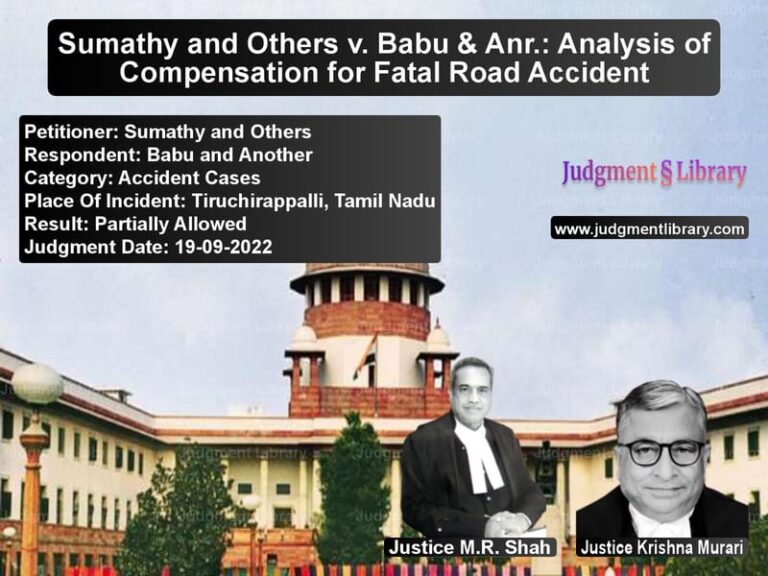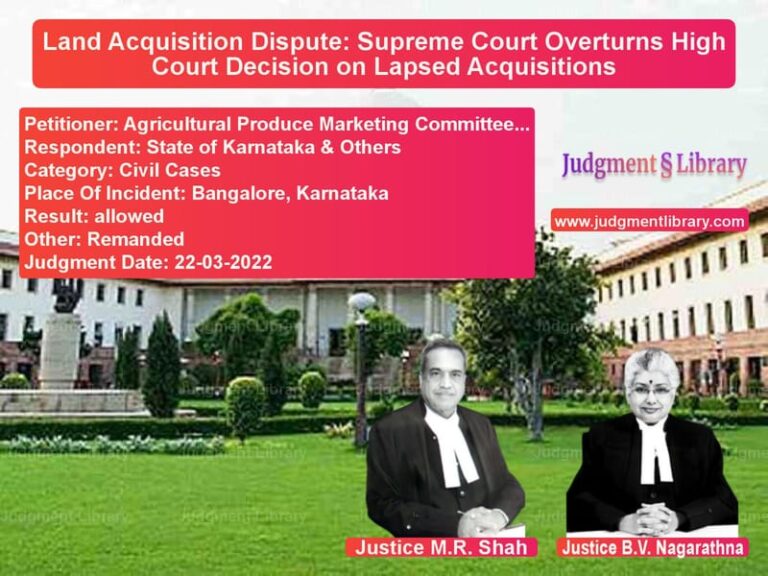Murder Conviction Modified: Supreme Court Reduces Sentence in Land Dispute Homicide Case
The case of Mariappan vs. State Represented by Inspector of Police revolves around a long-standing land dispute that culminated in a fatal altercation. The Supreme Court reconsidered whether the conviction under Section 302 IPC (punishment for murder) was justified or if the accused’s actions fell under Exception 4 to Section 300 IPC, making it a case of culpable homicide not amounting to murder.
Background of the Case
The case stems from an incident that occurred on March 17, 2009, in Neringipettai Village, Tamil Nadu. The dispute over a piece of land had caused tensions between the accused, Mariappan, and the deceased, Kolandaippam, for several years. Previous altercations had taken place, including a police-mediated compromise.
On the day of the incident, an argument escalated between the two parties. In the heat of the moment, the accused, along with two others, allegedly attacked the deceased. Mariappan was said to have stabbed the victim with a soori-knife, causing fatal injuries. Kolandaippam was rushed to the Government Hospital in Bhavani, where he was declared dead. A case was registered under Sections 302 and 324 IPC.
Read also: https://judgmentlibrary.com/supreme-court-quashes-fir-in-alleged-fuel-adulteration-case/
Petitioner’s Arguments
The appellant, Mariappan, contended:
- The incident was a sudden altercation, not a premeditated act.
- There was a long-standing enmity between the families, and the argument led to an impulsive reaction.
- He had inflicted only one fatal injury, while the other accused had caused multiple injuries, yet they were acquitted.
- The incident occurred in the heat of passion, and thus, it should fall under Exception 4 to Section 300 IPC, warranting a conviction under Section 304 Part-I IPC (culpable homicide not amounting to murder).
Respondent’s Arguments
The State of Tamil Nadu, representing the prosecution, countered:
- The accused intentionally inflicted fatal injuries, proving an intention to kill.
- The use of a soori-knife, a sharp-edged weapon, indicated that the accused had knowledge of the fatal consequences.
- The presence of multiple eyewitnesses established that the accused was the primary assailant.
- The trial court and high court had both affirmed the conviction under Section 302 IPC after considering the evidence.
Key Legal Issues Considered
1. Whether the Act Constituted Murder or Culpable Homicide Not Amounting to Murder
The Supreme Court examined whether the act satisfied the criteria of culpable homicide amounting to murder or if it fell under Exception 4 to Section 300 IPC, which applies to killings committed in sudden fights without premeditation.
2. Application of Exception 4 to Section 300 IPC
The Court analyzed precedents, including:
- Rampal Singh vs. State of U.P. (2012) 8 SCC 289: Establishing that the classification of homicide depends on intent, weapon used, and circumstances.
- Surinder Kumar vs. Union Territory, Chandigarh (1989) 2 SCC 217: Holding that sudden fights leading to death may warrant a conviction under Section 304 IPC instead of Section 302 IPC.
3. Consistency in Sentencing
The Court considered the fact that the co-accused, who inflicted multiple injuries, had been acquitted, while Mariappan, who inflicted a single stab wound, had been convicted of murder.
Supreme Court’s Verdict
The Supreme Court ruled in favor of modifying the conviction, making the following observations:
- The accused acted in a sudden fight, with no premeditated intention to kill.
- The fatal injury was inflicted in the heat of the moment, satisfying the criteria for Exception 4 to Section 300 IPC.
- The conviction was modified from Section 302 IPC to Section 304 Part-I IPC (culpable homicide not amounting to murder).
- The sentence was reduced to 10 years of rigorous imprisonment along with a fine of ₹50,000, payable to the victim’s family.
Key Takeaways from the Judgment
- Sudden Altercations Can Mitigate Sentences: If a killing occurs during a heated moment without prior intent, it may not constitute murder.
- Judicial Review of Sentencing is Crucial: The Court corrected sentencing inconsistencies where co-accused were acquitted despite playing a role.
- Weapon Used and Number of Injuries Matter: A single fatal injury in an unplanned altercation may lead to culpable homicide instead of murder.
- Intent is Key in Murder Cases: The Court reiterated that proving an intention to kill is crucial for a murder conviction.
This ruling ensures that sentencing aligns with the circumstances of the crime and prevents excessive punishment for crimes committed in sudden altercations.
Petitioner Name: Mariappan.Respondent Name: State Represented by Inspector of Police.Judgment By: Justice Vikram Nath, Justice Rajesh Bindal.Place Of Incident: Neringipettai Village, Tamil Nadu.Judgment Date: 24-11-2023.
Don’t miss out on the full details! Download the complete judgment in PDF format below and gain valuable insights instantly!
Download Judgment: mariappan-vs-state-represented-by-supreme-court-of-india-judgment-dated-24-11-2023.pdf
Directly Download Judgment: Directly download this Judgment
See all petitions in Murder Cases
See all petitions in Judgment by Vikram Nath
See all petitions in Judgment by Rajesh Bindal
See all petitions in partially allowed
See all petitions in Modified
See all petitions in supreme court of India judgments November 2023
See all petitions in 2023 judgments
See all posts in Criminal Cases Category
See all allowed petitions in Criminal Cases Category
See all Dismissed petitions in Criminal Cases Category
See all partially allowed petitions in Criminal Cases Category







